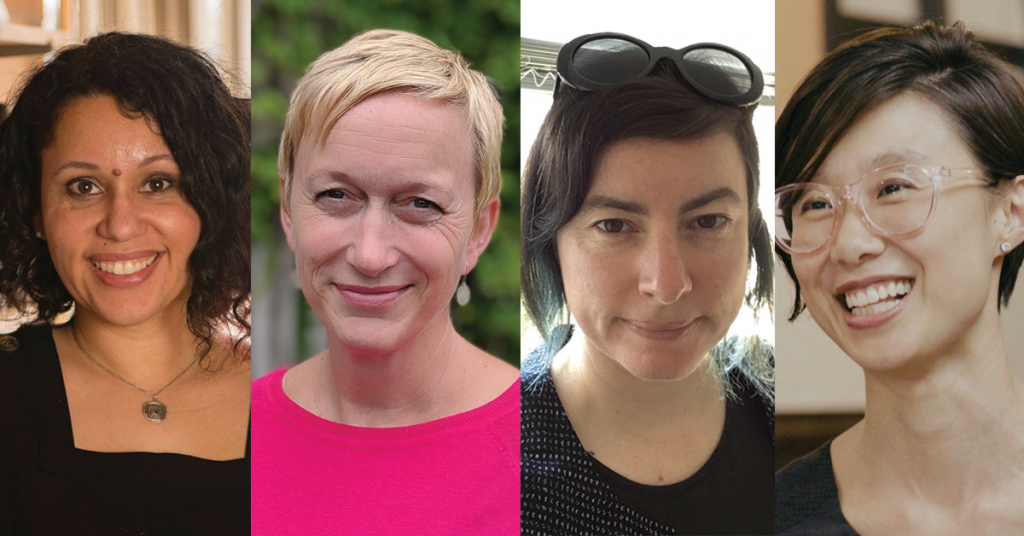
L-R: Karina Vernon, Carrie Dawson, Gillian Roberts, and Lily Cho
Karina Vernon is Associate Professor of English at the University of Toronto Scarborough where she researches and teaches Canadian literature with a special focus on black Canadian literature, archives, critical race theory, multiculturalism, and black-Indigenous solidarities. Her book The Black Prairie Archives: An Anthology (2019) brings to light a previously hidden archive of black writing, from the eighteenth-century black fur traders to contemporary writers. She is currently at work on two SSHRC-funded projects: Black Art and the Aesthetics of Spatial Justice, and, with her collaborator Winfried Siemerling, Call and Response-ability: Black Canadian Art and the Politics of Relation.
Carrie Dawson is the Dean of Arts and Science at Mount Saint Vincent University. Her recent scholarly work focuses on the representation of refugees and undocumented people in contemporary Canadian literature and culture.
Gillian Roberts is Associate Professor of North American Cultural Studies at the University of Nottingham. She is the author of Discrepant Parallels: Cultural Implications of the Canada-US Border (2015) and Prizing Literature: The Circulation and Celebration of National Culture (2011), editor of Reading between the Borderlines: Cultural Production and Consumption across the 49th Parallel (2018), and co-editor, with David Stirrup, of Parallel Encounters: Culture at the Canada-US Border (2014).
Lily Cho’s research focuses on diasporic subjectivity within the fields of cultural studies, postcolonial literature and theory, and Asian North American and Canadian literature. She is co-editor of Human Rights and the Arts: Perspectives on Global Asia. This book rethinks the contexts and subjects of human rights by taking its lead from writers, artists, filmmakers, and dramatists in Asia and the Asian diaspora. Her book, Eating Chinese: Culture on the Menu in Small Town Canada, examines the relationship between Chinese restaurants and Canadian culture. Her book, Mass Capture: Chinese Head Tax Certificates and the Making of Non-Citizens is forthcoming from McGill-Queen’s University Press. This book examines Chinese Canadian head tax certificates known as “C.I. 9’s.” Drawing from this archive, her research explores the relationship between citizenship, photography, and anticipation as a mode of agency. She is a co-editor of, and regular contributor to, the blog, Hook & Eye.
“North of Sixty: Surviving CanLit” by Nicholas Bradley
Canadian Literature celebrated its sixtieth anniversary in 2019—at a time when the broader world of Canadian literature has been in nothing resembling a festive mood. When the journal’s first issue was published in 1959, it would have been difficult to envision that, sixty years later, the critical conversation would be epitomized by phrases such as Resisting Canada (see Matuk) and CanLit in Ruins (see McGregor, Rak, and Wunker). Yet here we are.
At the Congress of the Humanities and Social Sciences at UBC in June, the journal hosted a panel discussion with ACCUTE—“CanLit and Canadian Literature”—intended to explore the place of institutions in a field that has been profoundly affected in recent years by acrimonious and polarizing public controversies; engaged in uneasy reckonings with its own limitations, oversights, and injustices; and riven by doubt and conflict. Panellists were asked to consider Canadian literature and literary studies by taking up such questions as: What are the necessary scholarly and public conversations today? What discourses of critique will lead to productive inquiry? How do journals and other institutions shape the field? And how can a more expansive and inclusive Canadian literature be imagined? The essays in this special forum emerge from the panel at Congress. They emphasize the importance of accountability and self-awareness for scholars and teachers of Canadian literature, and are evidence of the complexity of relationships between those individual practitioners and the institutions that influence and even sustain them.
When Canadian Literature turned fifty in 2009, a group of critics was invited to reflect on significant issues; their statements, as Laura Moss wrote in her Introduction to the “Interventions” section of issue no. 204, “mark[ed] the past fifty years while thinking forward to challenges in the field in the future” (103). The following essays suggest that the future of Canadian literary studies is now less certain, or at least less clear, than a decade ago. Lily Cho and Carrie Dawson look back at the fiftieth anniversary to show how much has changed in ten years, while Gillian Roberts writes about the difficulty and ambivalence inherent in teaching Canadian literature today—in her particular case, in the United Kingdom in the era of Brexit. At fifty, a future was presumed, and could be multiply conceived. At sixty, that very future is an open question. Karina Vernon proposes that one way forward is “to remember the genealogies of struggle developed within Canadian literature as critical discourse”—to rethink, in other words, the history of the field itself.
The anniversary of Canadian Literature is a time of reflection, but the sober conversations taking place here, as in other venues, hold the promise of genuine transformation of the ways in which we teach and write about literature in Canada—and of renewed engagement with the reasons for doing so. Journals, presses, courses, and even disciplinary formations come and go, but the impulses that underlie literary studies exceed any single institution, no matter how venerable. Together, we are in the business of reading and writing, of listening and responding, with care, precision, and creativity. In a time of social and political disharmony—and, I would add, environmental calamity—language and imagination, and the uses to which they are put, demand our attention and commitment. Whoever we are, our survival depends on it.
Works Cited
“Interventions.” 50th Anniversary Interventions, special issue of Canadian Literature, no. 204, 2010, pp. 103-62.
Matuk, Nyla, editor. Resisting Canada: An Anthology of Poetry. Signal, 2019.
McGregor, Hannah, Julie Rak, and Erin Wunker, editors. Refuse: CanLit in Ruins. Book*hug, 2018.
Moss, Laura. “Introduction: Generous and Grounded Connections.” 50th Anniversary Interventions, special issue of Canadian Literature, no. 204, 2010, pp. 103-08.
Canadian Literature issue 239, 60th Anniversary, is available to order through our online store.